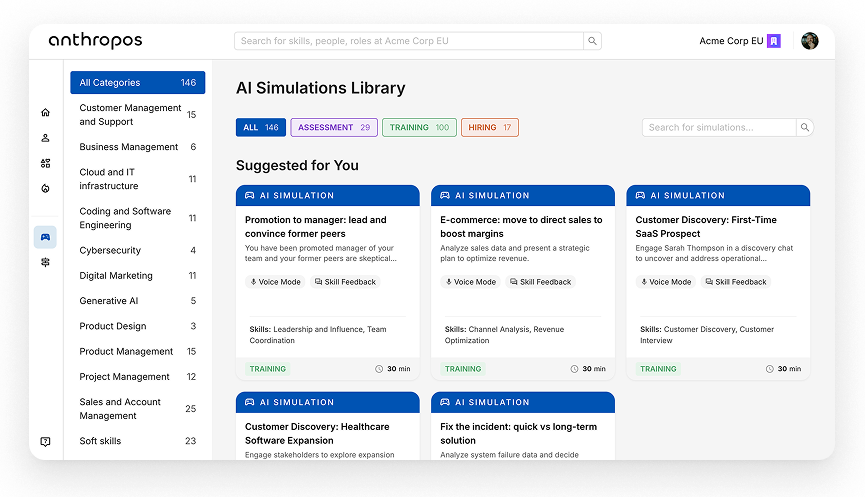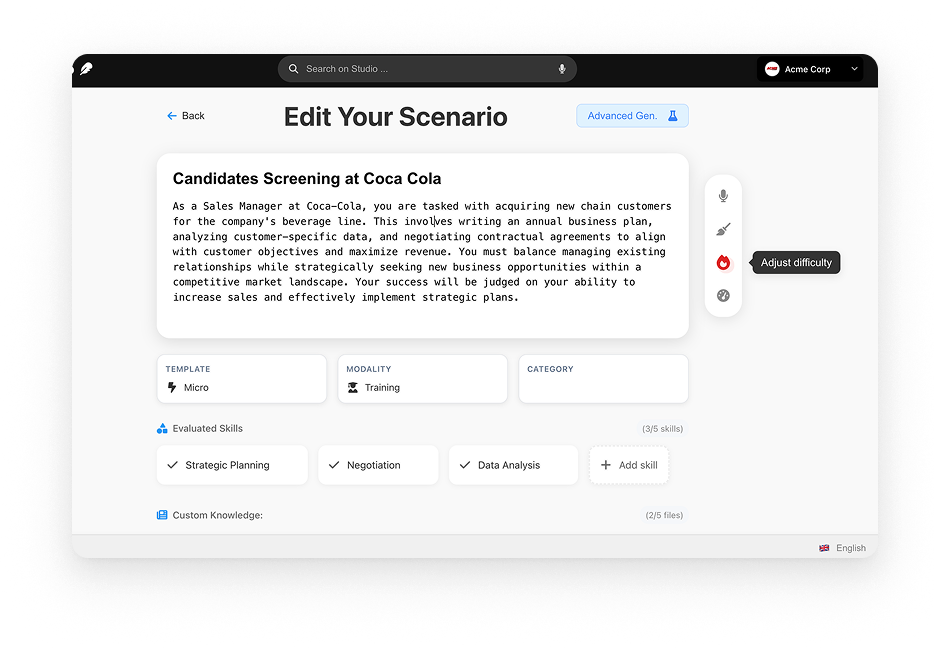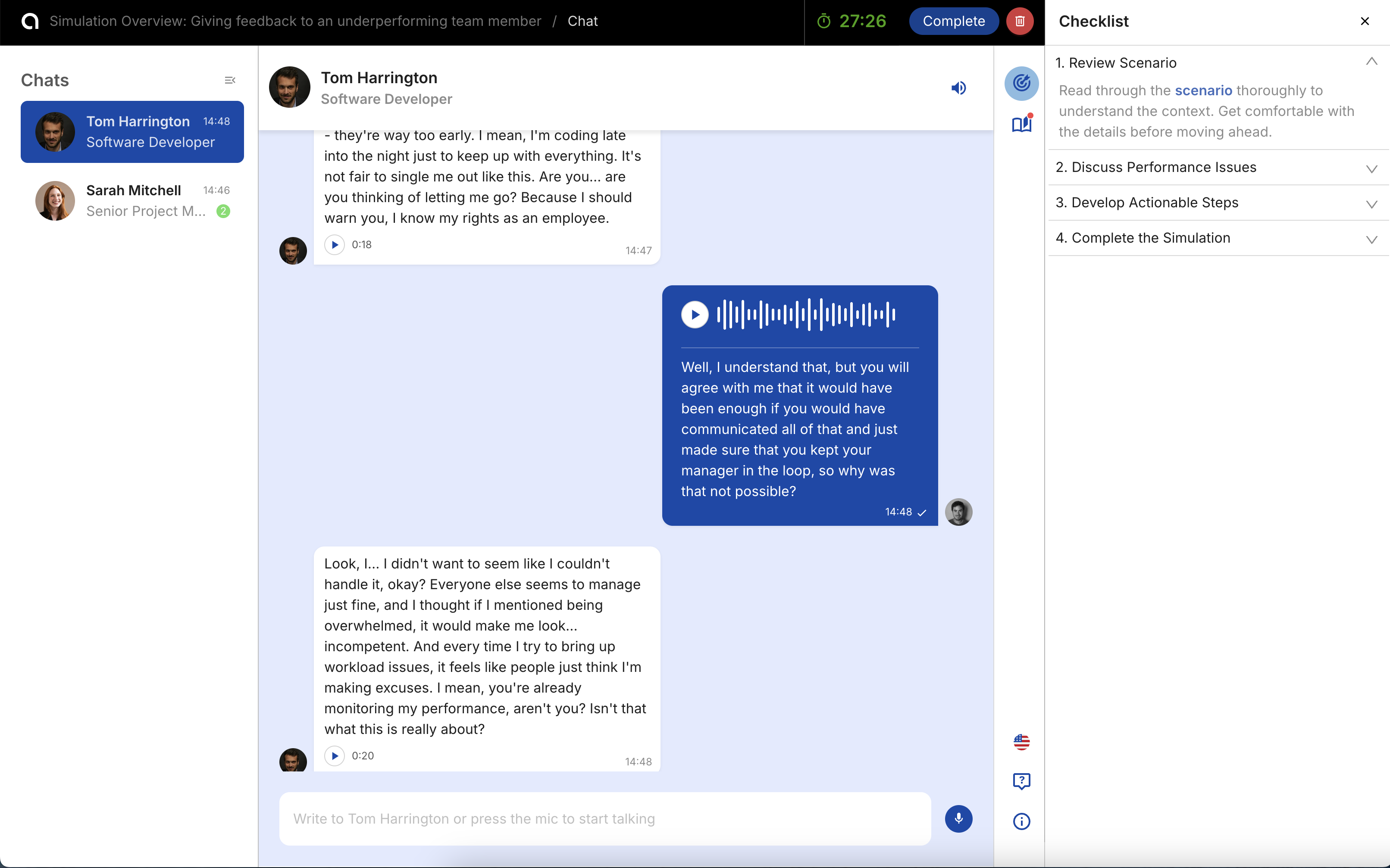Today I will tell you a bit more about our work behind the scene of Anthropos, the new company that Giacomo and I are building since the start of this year. We have spent 11 years building Cloud Academy, an enterprise e-learning platform for cloud technologies. In 2022 we left Cloud Academy and we started thinking about our next adventure. It’s been a ride and with this first article, I tell you a bit more about Anthropos, our decision to work together again, and the challenges and opportunities we have found until now.
I love reading about the real stories and people behind every company and I am sure many of our current members would like to know more about us and what’s next for Anthropos. This is likely become a series of articles where I try to cover several aspects of Anthropos, from our product idea to the challenges you face building a company in this space as a second-time founder. Today I will try to give you an overview of Anthropos and why we have focused on this problem.
Starting another company after 10+ years
We started our previous company on Feb 21, 2013, more than 10 years ago. That is the incorporation date of Cloud Academy Inc. – we really started working on it almost a year before then. Giacomo and I were younger, inexperienced and we definitely did not know how great of a ride that journey would have been. As we start a new company we have been reflecting a lot about what has changed (and how that changed us!) and how building a company in 2023 is so different compared to those days. I have written a bit about this experience on my personal blog and in this series of articles, I will definitely come back to it in relation to Anthropos.
There are definitely 2 areas that changed for us and are different in this new venture:
- People and team: back in the day our first hires were mostly people that I met at university and some colleagues from my previous startup or from Giacomo’s network. We knew they were great and we definitely spent time recruiting great people (that’s why Cloud Academy ended up being so successful) but we knew little about hiring talents and we did not have a well-oiled process to do so. I remember talking to one of our first engineers on the phone and making him an offer at the end of it. No long interviews or any structured process. Still, the team we put together was incredibly passionate and wanted to be successful. That did not change for us at Anthropos and those two things are still what we are looking for in people joining the team today. In a startup you don’t have space and time for people that are looking for a job, you absolutely need people that want to win, learn a ton and go big.
- Product quality and go to market: in 2012-2013 you could ship something online quickly without too many worries. Most MVPs were truly minimal, with bad UI/UX and several missing details. Users did not care a lot about it and if you were building something valuable and useful, they were easily signing up for your new software. I feel like today that approach is dead and most startups are launching well-designed products from day 1, where the bar is clearly high. In addition to that, getting the first users for your software was easy 10 years ago, SEO was still a big driver and people definitely wanted to try new things. Socials have changed how people promote their companies today, there are specific communities like ProductHunt and in general, signing up your first 1000 users is more difficult than in the past.
We decided to start Anthropos because of our passion for career and people development. After 10 years building and scaling an organization, we understood how difficult it is to do it well and how many companies are still pretty much unaware of how to do it. We also wanted to create something that we felt could be used by millions of people worldwide for such an important part of our lives, which is exactly what work represents. It felt like something important and truly challenging. It also reminded us that building hard startups is often the best thing to do.
Work, jobs, and people: challenges ahead for companies
Our main thesis behind Anthropos is simple: work is changing rapidly and it has big consequences for companies and individuals.
How is it changing? People are looking at work differently, they are more ambitious but also less inclined to spend years working for the same company without a clear path for their career. It creates all sorts of challenges for large and medium organizations: retaining people is more complicated than ever before and it requires a proactive approach to define career paths and growth strategies for their workforce. The price for not doing it is higher churn and even higher costs to replace critical skills and knowledge. Don’t think about critical and hyper-specific skills (e.g. Machine learning), think about skills in marketing, sales, customer success, and many other areas where a lot of your people do is connected to their knowledge of your product and customers. Losing them means losing great skills and ultimately slowing down your business.
We have decided to focus on a problem that has many dimensions. The biggest pushback we have heard while building Anthropos is: “This service will work only for companies that believe and invest in such an approach of growth for the employees” and it’s right. Companies that will not be able to invest in such an approach though, will definitely face existential challenges: technology is accelerating things and there are entire parts of our economy that live in a constant skill shortage. Giving up on people’s development and career growth will force these companies to rethink their costs and deal with constant turnover. The future, for most companies, is about building internal academies where they can train and develop exactly the skills and roles they need for the future. It’s less expensive than stealing employees from competitors and it also gives them incredible speed in the long term: the people you develop internally “absorb” your culture, and your values and somehow build skills that are 100% aligned to what the business needs. It’s an investment that compounds much faster than anything else you can do in terms of workforce development.
Last, but not least, we loved the idea of focusing on this problem because we have seen a lack of innovation in this space: do we need another talent management platform designed for HR managers? One that is mostly a database and builds incredibly beautiful reports for management?Maybe! we couldn’t find a modern solution that gives employees a clear understanding of what they can do, and how and has a modern approach to manage their career, inside and outside the organization. We believe this approach is needed if your employees are part of GenZ and don’t really recognize themselves in old and management-focused enterprise platforms. You will still want reports, data, and a lot of insights, but we need to consider how to keep end-users aligned and engaged with our strategy.
The old idea of career and why that doesn’t exist anymore
What’s the definition of career in 2023?
Nobody thinks of it as a 10 or 15-year journey in the same company, the one where you are moving from one role to another and you end up in executive positions right before your retirement. While in the past people would believe in such model, today employees are constantly looking for companies where they can learn new skills and constantly experience new things. Salary is still an important component, but it’s not the first one while learning and advancing is the first motivation to stay in a job or leave it. Several times their manager is all it takes to stay or leave, some other times that’s a bucket of different things, including the company’s values and the presence of a real career path. I could say that people adapted to a world that is definitely moving faster than in the past. If technology accelerated product and service development for millions of companies worldwide, it did the same for people’s appetite of growing and learning in their jobs.
Technology changed the number of skills and roles you will deal with in your career. Everything is constantly changing and so the title and specializations you had 5 years ago might be completely outdated by now (think about presenting yourself today as a DBA, or database administrator) forcing you to explore new job roles and new career paths every few years. This is already reality for most industries and still not valid in others, but if we move away from tech and look at other spaces, we will keep finding new good examples of how this is expanding to all industries and roles. Companies are currently struggling to find technician, engineers, and all sorts of roles able to support the shift to clean technologies, at different levels and for several skills.
If the old idea of career doesn’t exist anymore and skills are constantly evolving, there is another (positive) consequence we should consider. People will move across multiple roles (and departments) in their careers: modern software engineers can move to several commercial and technical roles, and the same is valid for thousands of job roles. Companies need to learn how to exploit this to the advantage of their people and their businesses because more and more people will be able to grow in adjacent departments and in areas where their skills can actually make a difference. Our industry calls this mobility and while it looks like something easy to do, it requires systems, frameworks and guidance for people and companies to adopt it.
For individuals and enterprise companies: our bet on building from the bottom up
What do you think if I say enterprise software? Probably something boring, designed for large and slow organizations with thousands of employees and tons of bureaucracy. Most of the enterprise software I know is exactly like that. It’s difficult to implement, difficult to adopt, and in the HR/learning/skills space is also designed for management, but not for the final users. In addition to this, selling enterprise software is getting more difficult year over year. That’s why we are working on building Anthropos with a bottom-up approach: we want to create enough value for end users to bring our product into organizations (like it happens with products like Slack) to increase utilization and reduce our cost of acquisition of new customers. We have worked with this model in the past and we know it’s one of the most difficult ones, but it’s also incredibly powerful once you figure it out. Working with people and companies it felt like the right space to have a bottom-up approach, something that most of our competitors don’t really do. The closest product to what you can use today to manage your career is LinkedIn and we are all familiar with it, but over the years it became more of a social network than something you truly use to learn new things and understand where to go next. The same is true for companies: we all use it to find new employees or clients, but we rarely think of it as something we can use to manage our people and their growth.
The main challenge of this approach is definitely creating a product that has value for both audiences and that can easily scale inside an organization. There are still several things we are brainstorming about but we definitely think our approach is unique in this space. It’s mostly because we are envisioning Anthropos as ways for people and companies to learn the jobs of tomorrow and practice them, for any role and industry. It’s like a global library where you get to see and try jobs, discover skills and curate what you want to do. Companies can somehow do the same for their organization and skills, with a system that lets them build exactly what they will need tomorrow, with their people.
Anthropos is completely free for Individuals and you can create your profile here. We just launched a premium version of it and soon we will release our core product, the enterprise version dedicated to companies.
Thank you for reading me and I hope you enjoyed learning a bit more about this journey. I will be back in a few weeks with the second part.
Stefano
August 8, 2023


